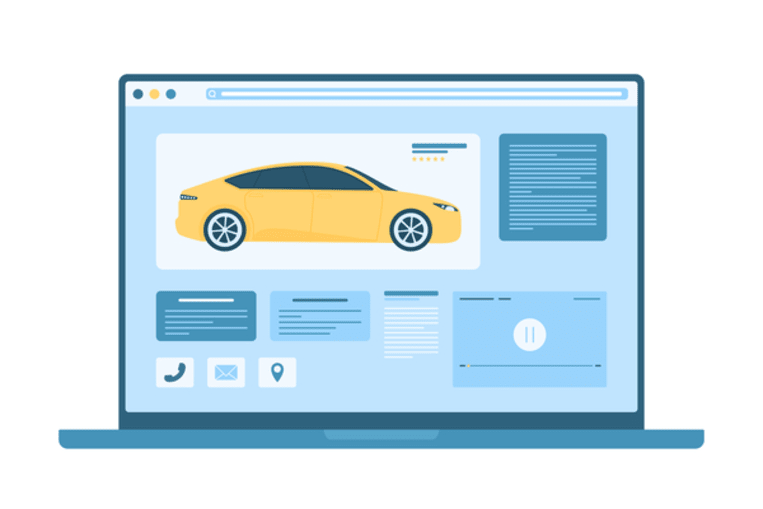
BBB Scam Alert: Beware of vehicle history report scams

(Getty)
Watch a video about this article: In English En Español.
If you are selling your car or truck, a potential buyer may ask to see a vehicle history report. It’s usually a reasonable request, but it’s also the premise of a current scam. BBB Scam Tracker is receiving reports of a con that tricks sellers into purchasing vehicle reports through scam sites.
According to one report, this latest scam involved a man looking to sell his vehicle by posting an advertisement on a local website. He was contacted by someone who claimed to be interested in purchasing it. This potential buyer wanted a report on the vehicle’s identification number (VIN) and asked the seller to purchase one through an unfamiliar website. Fortunately, this seller recognized the scam and reported it to BBB, but plenty of others have fallen for the con.
Some of these scam sites may simply be a way to steal $20 from unsuspecting customers. But if the site captures personal information, such as an address, driver’s license number, and/or credit card information, buying these reports opens up victims to the risk of ID theft. In other cases, the website link itself may be the scam, downloading malware to the victim’s computer.
In a recent example of a vehicle history report scam, a car seller from Alpharetta, Georgia, reported: "I am trying to sell my ATV (4-wheeler) online. The scammer texted, wanted to buy it, but asked for the TAP report. [Redacted website] is a report claiming to provide vehicle history. They don't. It was all a scam." Another reported being contacted by someone wanting $27 for a car history report but "these 'interested buyers' are actually commissioned agents who have NO INTENTION of buying the car... this guy is persistent."
Tips to avoid this vehicle history report scam:
Be wary if a potential buyer asks you to purchase something from a specific website as a condition for a sale. While an interested buyer may want a VIN report prior to purchasing your vehicle, check out the site yourself and research it on BBB.org.
In the United States, the National Motor Vehicle Title Information System, a division of the Department of Justice, provides a list of approved providers on their website, vehiclehistory.gov. Insurance carriers, salvage yards, and junk yards are required by federal law to report specific information to NMVTIS.
The following information is available through NMVTIS:
- Information from a vehicle's current title
- Information about the status of the vehicle, such as whether it’s been classified as “junk,” “salvage,” or “flood”
- The latest reported odometer reading
- Reports of the vehicle being transferred or sold to an auto recycler, junk yard, or salvage yard
In Canada, the Insurance Bureau of Canada, the national insurance industry association, offers vehicle history reports. Carfax also offers Canadian vehicle history reports.
Scams to avoid when selling your vehicle:
Selling your car or truck through an online classifieds site may help you fetch a higher asking price. Unfortunately, independent sellers are often targets of current scams. In addition to the vehicle report scam, be sure to look out for these common warning signs:
- Check or money order sent for more than the price of the vehicle. The buyer requests that you ship the car or truck and keep the overage. Checks or money orders should be confirmed as legitimate before the vehicle is delivered. See BBB's fake check scam study for more information.
- The buyer offers full payment without even seeing the vehicle.
- A buyer offers to pay through eBay’s Vehicle Purchase Protection program when buying the vehicle through another website. eBay calls this fraud and says its Vehicle Purchase Protection covers only certain vehicle transactions that are completed on eBay.com.
For more information
Read more about online sales scams on BBB.org. If you've been a victim of a vehicle purchase scam, help others avoid being scammed by filing a report with BBB.org/ScamTracker.
Learn more about current scams and how to avoid them at BBB.org/ScamTips. Subscribe to BBB’s Scam Alert emails for weekly updates on the latest scams.
Thanks to the BBB Serving Utah, BBB of West Florida, and BBB of Northeast California for their reporting on this scam.
Still Need Assistance?
Contact Your Local BBB
Your local Better Business Bureau can assist you with finding businesses you can trust. Start With Trust®.
Additional Resources
Let BBB help you resolve problems with a business
Research and report on scams and fraud using BBB Scam Tracker
Learn more about the value of BBB Accreditation